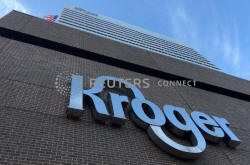From T-shirts to ice cream, Kroger pushes house brands in grocery wars
 Send a link to a friend
Send a link to a friend
 [June 20, 2019] By
Emma Thomasson and Richa Naidu [June 20, 2019] By
Emma Thomasson and Richa Naidu
BERLIN/CHICAGO (Reuters) - Multicolored,
sparkly ice cream is an unlikely battleground in U.S. grocery stores.
But Kroger Co believes products like Kroger Best Unicorn Swirl ice cream
will help it win market share from Walmart Inc, Aldi and Amazon.com Inc.
By churning out trendy new house-brand items, Kroger hopes to tap into
broad sales growth for private labels. The push comes as grocers compete
fiercely on price and race to expand online ordering and delivery, an
area where the biggest U.S. grocery chain has lagged.
Kroger added 1,022 "own brand" items in 2018, and each supermarket on
average stocks more than 15,000 private-label products such as pet food,
clothes, furniture, meal kits and office supplies. Kroger's 16 house
brands now account for more than 30% of unit sales, the company said in
March.
"We don't see this slowing down at all," Kroger Chief Executive Rodney
McMullen told Reuters in an interview in May.

Cincinnati-based Kroger has long made store brands that compete with
name brands from Kraft Heinz Co, Nestle and others. But it started
focusing more on its own brands in 2012 and flagged them as key to
reviving sales growth when introducing its “Restock Kroger” plan two
years ago.
Graphic on store brand growth: https://tmsnrt.rs/31Ff7UN
Kroger's Simple Truth line hit $2.3 billion in annual sales to become
the biggest U.S. natural and organic brand, the grocer said in March.
Sales of its Kroger range and premium Private Selection food line are
also growing, with the total own brand portfolio expanding 45% since
2011.
Kroger has been using data to spot trends and jump on them quickly,
McMullen told Reuters, and unicorn ice cream is one example.
Starbucks Corp kicked off the unicorn food craze in 2017, sparking a
social media frenzy with its pink and blue Unicorn Frappuccino.
Breakfast cereal and cake followed, and Target Corp launched a
cherry-flavored Unicorn Magic ice cream last year.
Kroger debuted its cake batter-flavored Unicorn Swirl in March, and saw
more than 2.5 million likes and shares on social media for the product
on National Unicorn Day on April 9. It declined to comment on sales,
beyond saying they had far exceeded the company's expectations.
"Kroger has been very clever about expanding into rapidly growing
categories," said Neil Saunders, who heads retail consultancy GlobalData,
highlighting brands like Simple Truth and Home Chef meal kits.

Simple Truth has likewise benefited from a social media boost. Kayla
Schneider, 28, a vegan receptionist and beauty advisor from Fenton,
Michigan, has 11,000 Twitter followers and earlier this year tweeted
when Simple Truth vegan ice cream went on sale.
“I have a lot of followers who also share my type of diet and I like
sharing new finds/yummy products so they can try them out as well,”
Schneider said in a Twitter direct message.
Almost half of Kroger's private-label grocery lines, including bakery
and dairy items, are produced in its 37 plants, giving it an advantage
over rivals when it comes to quickly creating and testing out items.
Kroger makes more in-house than other U.S. retailers, with Walmart
outsourcing all store-brand production until very recently, when it
opened a dairy in Indiana, retail consultant Roger Davidson said.
"They (Kroger) are very serious about private label and in my opinion
better than any consumer goods company in the U.S.," said Davidson, who
used to oversee food procurement at Walmart. "Big CPG companies are
really struggling," he said, referring to consumer packaged goods
makers.
Kroger reports quarterly earnings on Thursday. It has been looking for
ways to claw back market share from Walmart, the world's biggest
retailer, and German discount chain Aldi. It also has to grapple with
Amazon's fast-growing private-label sales, both online and in Whole
Foods.
Aldi shares tanked in March when it reported a 10% fall in
fourth-quarter revenue and lower-than-expected earnings for the first
time since October 2017.
[to top of second column] |

The Kroger supermarket chain's headquarters is shown in Cincinnati,
Ohio, U.S., June 28, 2018. Picture taken June 28, 2018. REUTERS/Lisa
Baertlein/File Photo

FAMILIES CAN SAVE $3,000 A YEAR
Soaring commodities and freight costs have pressured margins at companies like
Procter & Gamble Co and Unilever PLC in recent years, making it harder for them
to compete.
Private-label products on average are about 20% less expensive than branded
goods, according to data from market research firm IRI.
Nestle said in April there was no point in its Pure Life brand trying to
outcompete private-label bottled water. The world's No. 1 consumer company is
expanding its premium, fizzy and flavored waters to eventually outweigh some
lost volumes.
At a Kroger-owned Mariano's in Chicago, 24 bottles of own-brand water cost $2.50
versus $4.99 for Pure Life.
A U.S. family of five can save up to $3,000 a year buying private-label food,
and get equal or higher nutritional value, according to Burt Flickinger,
managing director of retail consultancy Strategic Resource Group.
U.S. private-label packaged food sales were $65.42 billion last year, up 7% from
2013, according to Euromonitor.
Own-brand products made up 14.9% of U.S. store sales in 2018, up half a
percentage point, with frozen, pet and baby products growing fastest and
millennials buying most, according to IRI.
That compares with an international average of 39.4%. The share is highest in
Britain at 52.5%, in part due to discounters like Aldi.

Aldi is expanding rapidly in the United States and seeks to become the No.3 U.S.
grocery chain with 2,500 stores by 2022. It sells products that are almost
entirely house brand, including weekly deals on clothes, toys and homewares.
Last fall, Kroger rolled out an in-house fashion label called Dip, sold in 305
of its 2,800 stores. It added Dip homewares and furniture in 525 stores earlier
this year.
But analysts say Dip, with clothes that are $19 or less, has been underwhelming.
"Any grocer that goes into non-food often doesn't do very well," GlobalData's
Saunders said.
A Kroger spokeswoman said customer response to both Dip apparel and home goods
had been favorable.
KETO, PALEO, FLEXITARIAN
Kroger has a 400-person team developing its brands. The company poached Gil
Phipps in 2012 from Texas-based retailer H-E-B, which has sought to emulate
British store brand leaders like Sainsbury's since the 1990s.
Phipps said Kroger's consumer trend data will dictate where it expands next: "We
will continue to introduce more plant-based foods and products that fit various
eating styles like keto, paleo and flexitarian."
But Walmart has also been adding private labels, while already squeezing Kroger
on price and outperforming on e-commerce and automation.
In March, Walmart launched its Hello Bello line of plant-based baby products
with actor couple Kristen Bell and Dax Shepard. A month later, it introduced
Unicorn Sparkle ice cream selling for $2.24 for 48 ounces, compared to $2.50 for
Kroger's Unicorn Swirl.
"I want to offer the best quality products for the best price, and we have been
concentrating on that and I’m thrilled with the progress we have made,"
Walmart's U.S. CEO Greg Foran told shareholders earlier this month.
As part of the "Restock Kroger" drive, the company is also investing in store
revamps and delivery, although a joint venture with British online grocer Ocado
is taking time to ramp up.
"I worry whether Kroger is really keeping the end consumer in mind. They have so
many irons in the fire," said consultant Davidson.
(Additional reporting by Siddharth Cavale in Bengaluru and Nandita Bose in
Washington; Editing by Meredith Mazzilli)
[© 2019 Thomson Reuters. All rights
reserved.] Copyright 2019 Reuters. All rights reserved. This material may not be published,
broadcast, rewritten or redistributed.
Thompson Reuters is solely responsible for this content. |